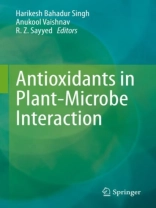This edited book is focused on antioxidant compounds and their biosynthesis, up-regulation, mechanism of action for selective bioactivity, targeted role and the advancement of their bioactive potential during plant-microbe interaction and other stress conditions. This book also emphasizes on the role of antioxidants in recruiting beneficial microbes in plant surroundings. Antioxidants have multiple biological roles in plants especially in the signalling pathway. These compounds are secondary metabolites produced besides the primary biosynthetic pathway and are associated with growth and development. Besides they also have special role to play during oxidative stress produced via abiotic stimulants or pathogen attack. This understanding of the biosynthesis, signaling and function of antioxidant compounds in plants during stress condition is helpful in restoring plant ecosystem productivity and improve plant responses to a wide range of stress conditions. This book is a useful compilation for researchers and academicians in botany, plant physiology, plant biochemistry and stress physiology. Also the book serves as reading material for undergraduate and graduate students of environmental sciences, agricultural sciences and other plant science courses.
Table des matières
Chapter 1. Antioxidants in Plant-Microbe Interaction.- Chapter 2. Plant microbe symbiosis led synthesis of bioactive compounds.- Chapter 3. Plant-Rhizobacteria communications with antioxidant system.- Chapter 4. Association of Non-Enzymatic Antioxidants in Plant Holobiont.- 5. Carotenoids and flavonoids in plant stress management.- Chapter 6. PGPR-the redeemer of rice from abiotic stress.- Chapter 7. Impact of PGPR on plant health and antioxidant enzymes under water stress conditions.- Chapter 8. Rhizospheric plant-microbe interactions releasing antioxidants and phytostimulating compounds in polluted agroecosystems.- Chapter 9. Role of Antioxidant in plant and microbes based remediation of metal stress.- Chapter 10. Amelioration of drought stress through PGPR mediated regulation of Antioxidant defensive machinery.- Chapter 11. Potential of plant growth promoting microbes in disease reduction by influencing the antioxidant enzymes of medicinal and spice plants.- Chapter 12. Antioxidants in spices: a review of the antioxidant components and properties of some common african spices and their role in human nutrition and plant-microbe interactions.- Chapter 13. Impact of plant growth promoting microbes (PGPM) in plant disease management by inducing non-enzymatic antioxidant.- Chapter 14. Antioxidants as modulators of plant defense against soil-borne fungal pathogens upon microbial interaction.- Chapter 15. A Promising Approach of Managing Seed Borne Pathogens through Plant Growth Promoting Microbes.- Chapter 16. Antioxidant Potential of Plant Growth Promoting Rhizobacteria (PGPR) in Agricultural Crops Infected with Root Knot Nematodes.- Chapter 17. Disease management and the role of antioxidants in combating plant pathogens upon PGPR inoculation with special reference to legumes.- Chapter 18. Rhizobacters as remedy of stress tolerance in potato plant.- Chapter 19. Secondary metabolites, boon for plants; their role in defence mechanism and antioxidant activity of Anthocephalus cadamba.- Chapter 20. Role of PGPR in conferring drought stress tolerance in Rice.- Chapter 21. Fenugreek-rhizobium symbiosis and Flavonoids under stress condition.- Chapter 22. Datura stramonium: An overview of its antioxidant system for plant benefits.- Chapter 23. PGPR mediated regulation of antioxidants: Prospects for abiotic stress management in plants.- Chapter 24. Prospects of PGPRs mediated antioxidants and S and P metabolism in plants under drought stress.- Chapter 25. Prominence of Antioxidant Potential of Plants and its induction by interaction with microorganisms.- Chapter 26. Bio-molecular painstaking utilization and assimilation of phosphorus under indigent stage in agricultural crops.- Chapter 27. Plant Antioxidant System Regulates Communication Under Abiotic Stress For Enhanced Plant Productivity.- Chapter 28. Nematophagous fungi in antioxidant mediated defence against plant parasitic nematodes.- Chapter 29. Biopriming and Nanopriming: Green Revolution Wingsto Increase Plant Yield, Growth and Development under Stress Condition and Forward Dimensions.
A propos de l’auteur
Dr. H. B. Singh is Distinguished Professor, Department of Biotechnology, GLA University, Mathura, India. He has served as Professor & Head, Department of Mycology & Plant Pathology, Banaras Hindu University.Also served as Scientist at CSIR-Central Institute of Medicinal & Aromatic Plants, Lucknow and CSIR-National Botanical Research Institute, Lucknow. He has also served the Department of Science & Technology and Department of Biotechnology, Government of India in various project advisory committees. His major focus is on biopesticides and biofertilzers. Prof Singh has received several national awards viz., CSIR Technology Prize, BRSI Industrial Medal, CSIR Award or Science & Technology Innovations for Rural Development, Prof P. Maheshwari Medel, Mundkur Memorial Award, M S Sw^295 research papers, 42 review articles, (with over 8722 citations and h-index 48 as per Google Scholar).He is editor, co-editor and author of 30 books.
Dr. Anukool Vaishnav is working as an Assistant professor in Department of Biotechnology, GLA University, Mathura. He operated SERB-National Postdoctoral Fellowship (NPDF) project as a Principal Investigator at Department of Mycology and Plant Pathology, Institute of Agricultural Sciences, Banaras Hindu University, Varanasi, India. He has 7 years of research experience in Agriculture Microbiology. His research is mainly focuses on microbial mediated plant protection against biotic and abiotic stress, characterization of signaling molecules and secondary metabolites (soluble and VOCs) in plant holobionts. As an active researcher, he has published more than 21 research and review articles along with 15 book chapters for reputed journals and edited books. He has filed 9 Indian patents in association with his research group. He is an editorial member of Current Genomics Journal published by Bentham Science. He has been awarded with Young Scientist Award from reputed societies.
Dr. R. Z. Sayyed is a Professor and Head, Department of Microbiology, PSGVP Mandal’s ASC College, Shahada, (KBC North Maharashtra University, Jalgaon), India. He serves as the President of India Chapter of Asian PGPR Society for Sustainable Agriculture. He is a recipient of the Best Teachers Award, Young Scientist Award, Prof M M Sharma Award, Springer-Society Award, Award for Excellent Contribution-Environmental Sustainability, and Award for Excellence in PGPR Research. He has over 24 years of teaching and research experience in Microbiology. He has authored 132 research papers, 25 book chapters and has edited 18 books. He has delivered many invited talks at several South East Asian and European Countries. He is associated with many International Research Journals in various capacities.












